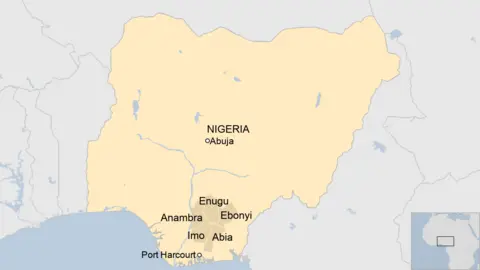Biafra quest fuels Nigeria conflict: Too scared to marry and bury bodies
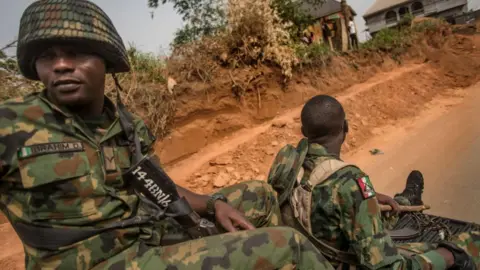 Getty Images
Getty ImagesA spate of gruesome killings, kidnappings and extortion rackets has left residents of south-eastern Nigeria living in fear. An armed group is fighting for the region's independence but the line between its campaign and criminality has become increasingly blurred.
The unrest has forced people to flee villages where they led a peaceful life until just a few years ago.
"My uncle ran away from the village because these people asked him to give them money to buy guns and bullets. Our villages are empty because they are the law now," said a man who we will call Chike Anyikwa to protect him from reprisals.
Encamped in nearby forests, the armed men have formed a parallel government in Mr Anyikwa's ancestral village, and many others, in Imo State, which, alongside Anambra State, is hardest-hit by the conflict.
Similar camps exist in the three other states, Abia, Ebonyi and Enugu, that make up the south-east - which the fighters would like to become the independent state of Biafra.
The armed men have usurped the powers of government officials and traditional rulers. If anyone wants to hold a marriage or burial ceremony, they need their permission - and have to pay a fee to get the go-ahead.
Gang leaders have even assumed responsibility for resolving disputes among villagers over issues such as land rights - a sign of the extent to which they have taken control.
Mr Anyikwa lives in Enugu city and - like thousands of others - could not spend the last two Christmases at his village, breaking with the tradition of going back to reconnect with his ancestral roots.
"A relative did a traditional marriage in our village. Nobody went. Fear didn't allow anyone to go. The security agents come from Owerri [the capital of Imo State] and then go back because many of the police stations have been destroyed.
"The law that people know is the one that has been imposed by the unknown gunmen, who say they are for Biafra, but we know they are not," he added.
The creation of Biafra has been a long-cherished dream of many Igbo people who want the south-east, and part of the Niger Delta, to be their independent homeland.
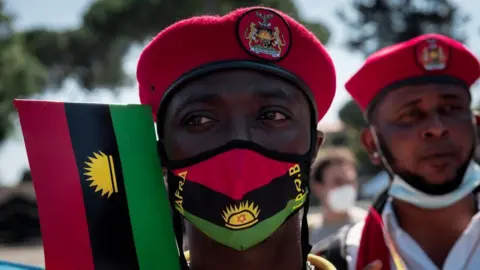 Getty Images
Getty ImagesKnown for their entrepreneurial skills, Igbos are Nigeria's third-largest ethnic group, making up about 15% of the country's estimated population of about 217 million, according to statista.com.
The secessionist campaign first gained impetus in the 1960s, when an Igbo army officer, Emeka Odumegwu Ojukwu, declared the birth of Biafra following killings of south-easterners in northern Nigeria, but the attempt at secession ended after a bloody three-year war that led to more than a million deaths from fighting, starvation and a lack of medical care.
Despite the failure of Lt-Col Ojukwu's campaign, the secessionist sentiment has lingered on ever since, with its latest torchbearer being the Indigenous People of Biafra (Ipob) group.
Formed in 2012 by two UK-based Igbos, Nnamdi Kanu and Uche Mefor, as a peaceful movement, it launched an armed wing, the Eastern Security Network (ESN), in south-eastern Nigeria in 2020, saying it was doing so to defend Igbos, though its critics say it has unleashed violence that has caused huge suffering.
Nigeria's government has proscribed Ipob and a court has designated it a "terrorist" organisation. Government critics say the attempt to destroy the group through military force has added to the suffering of civilians who have seen their villages raided by troops, and young men being detained or killed on the mere suspicion of being supporters of the movement.
The continued detention by Nigeria's security agents of Mr Kanu, despite a court ordering his release after ruling that he had been illegally arrested abroad, has meant that the group no longer operates as a coherent force, with a clear command structure or political programme.
Instead, it has split into feuding factions - some of which are more violent and less disciplined, causing Ipob to lose the support of many Igbos who had backed it when it was formed.
Attacks across the region by armed men, who the Nigerian security agencies link to the group, have led to the killing of hundreds of civilians and security force members since the violence started in 2020.
Women, children and the elderly have not been spared.
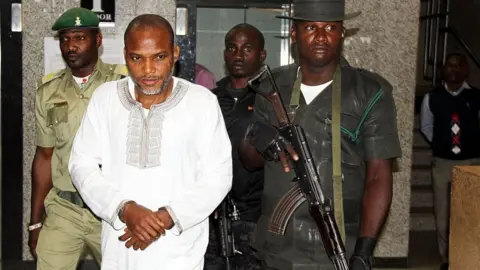 Getty Images
Getty ImagesIn a horrific case of violence during the Christmas holiday, the video of a naked and bound woman trended on social media.
She was later identified as a Nigerian army officer, who had gone to visit her grandmother in Abia State, when gunmen abducted her, and released the video in which they threatened to kill her.
A female soldier travelling for her traditional marriage was similarly abducted in May 2022 and her captors released a video showing them killing and decapitating her. Her fiancé, a retired soldier, and his nephew were also killed by the men who claimed to be separatists.
The abductors of the army officer referred to themselves as Unknown Gunmen fighting for Biafra, and deny being affiliated to Ipob.
This is how many of the gangs identify themselves in their videos, seemingly mocking the media that often attribute violence in the region to unknown gunmen.
Eyewitnesses told the BBC that soldiers were torching homes and businesses in villages as they searched for the army officer and her abductors. The spokesman for the 34 Artillery Brigade in Obinze in Imo State, Capt Joseph Akubo, told the BBC that soldiers weren't responsible for the arson attacks.
However, such arson attacks are not uncommon in the region. In one of the most shocking cases, in October 2021 soldiers were accused by locals of burning down more than 40 houses in Izombe village in Imo State after two soldiers and a civilian were killed in a clash between youths and soldiers.
Vigilante groups, formed with government backing to help curb insecurity, have also been accused of atrocities - a notable case being the killing of five young men who were said to be returning from a wedding in Awomama village, also in Imo State, in July 2022.
Chigozie Ekesinachi, whose two siblings were among the dead, said the state-sponsored vigilante group Ebubeagu was behind the killings.
He added that the vigilantes assaulted him and some of his relatives, and detained them when they identified themselves as the family of the dead, whose bodies were still at the scene. The Department of State Security (DSS) later admitted responsibility for the killings, stating that the men were separatist fighters.
People who identified themselves as separatists have also been accused of targeting civilians - in December 2021, two traditional leaders were abducted from their palaces.
One of them, Paul Ogbu, was killed and his body dumped in a pit with other decomposing corpses, while security forces rescued the other traditional leader, Acho Ndukwe, from the gunmen's camp.
A video released later showed the two elderly men being tortured by their captors, and accused of being saboteurs of the Biafran independence campaign.
Several other traditional chiefs have also been abducted, and had their palaces burnt or killed by suspected separatists.
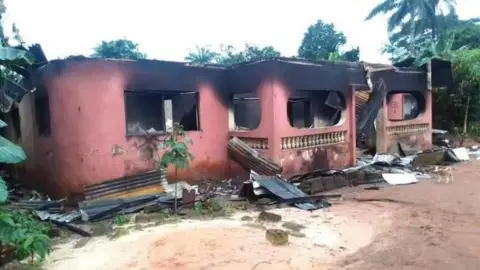
Chidiebube Okeoma, a journalist who covers Imo State for Nigeria's Punch newspaper, said the insecurity extends to the state capital.
"Owerri was known for its nightlife activity, but all that is gone now because of pockets of killing. When people see strange faces, they will take cover. If a car tyre bursts, people will start running. Imo was not like this," he said.
The city, like all other cities and towns across the south-east, is deserted every Monday, as separatists enforce a "sit-at-home" order, shutting businesses, schools and government offices.
It has led to students missing crucial examinations and businesses suffering heavy financial losses.
"Even the governors are inside their government houses, obeying the sit-at-home order," Mr Anyikwa commented wryly.
He fears that many people in the south-east will not be able to vote in next month's general election, as some of the separatist factions have called for a boycott of the polls.
Furthermore, armed men, claiming to be acting for the Biafra cause, have attacked offices of the Independent National Electoral Commission (Inec) and people registering to vote. They also killed an Inec staff member in 2022.
"I am very ashamed about the state of insecurity in the south-east," Mr Anyikwa said.
At this point, the violence seems to have no end in sight. On 2 January 2023, five people, including the president general of Obosi town, close to the commercial city of Onitsha in Anambra State, were killed in what the state government described as "cult-related killings".
On the same day In Imo State, four police officers were killed when the convoy of the former state governor, Ikedi Ohakim, was attacked by armed men. The bullet-proof vehicle they were in saved Mr Ohakim and his children.
President Muhammadu Buhari, who fought on the Nigerian side during the Biafran civil war, had vowed to treat the separatists in "the language they understand" in June 2021, drawing widespread criticism and the deletion of the tweet by Twitter.
He is due to step down after the election, with Mr Okeoma hoping that his successor will take steps to resolve the conflict in the south-east and conflicts in other parts of Nigeria.
"It is a failure of government," he said.
"It is something that can be resolved if a holistic approach is followed," Mr Okeoma added.
